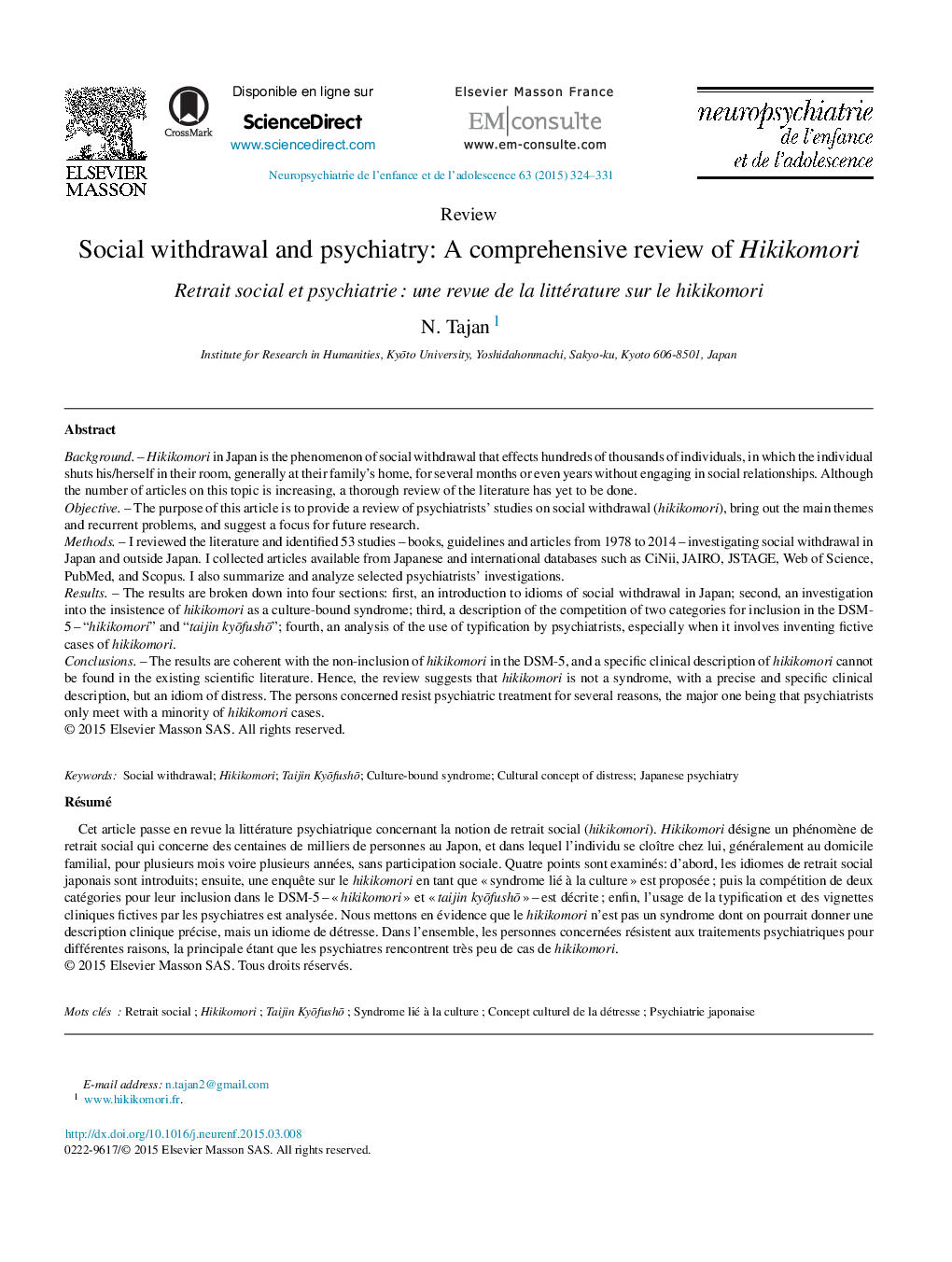| کد مقاله | کد نشریه | سال انتشار | مقاله انگلیسی | نسخه تمام متن |
|---|---|---|---|---|
| 943740 | 925555 | 2015 | 8 صفحه PDF | دانلود رایگان |

BackgroundHikikomori in Japan is the phenomenon of social withdrawal that effects hundreds of thousands of individuals, in which the individual shuts his/herself in their room, generally at their family's home, for several months or even years without engaging in social relationships. Although the number of articles on this topic is increasing, a thorough review of the literature has yet to be done.ObjectiveThe purpose of this article is to provide a review of psychiatrists’ studies on social withdrawal (hikikomori), bring out the main themes and recurrent problems, and suggest a focus for future research.MethodsI reviewed the literature and identified 53 studies – books, guidelines and articles from 1978 to 2014 – investigating social withdrawal in Japan and outside Japan. I collected articles available from Japanese and international databases such as CiNii, JAIRO, JSTAGE, Web of Science, PubMed, and Scopus. I also summarize and analyze selected psychiatrists’ investigations.ResultsThe results are broken down into four sections: first, an introduction to idioms of social withdrawal in Japan; second, an investigation into the insistence of hikikomori as a culture-bound syndrome; third, a description of the competition of two categories for inclusion in the DSM-5 – “hikikomori” and “taijin kyōfushō”; fourth, an analysis of the use of typification by psychiatrists, especially when it involves inventing fictive cases of hikikomori.ConclusionsThe results are coherent with the non-inclusion of hikikomori in the DSM-5, and a specific clinical description of hikikomori cannot be found in the existing scientific literature. Hence, the review suggests that hikikomori is not a syndrome, with a precise and specific clinical description, but an idiom of distress. The persons concerned resist psychiatric treatment for several reasons, the major one being that psychiatrists only meet with a minority of hikikomori cases.
RésuméCet article passe en revue la littérature psychiatrique concernant la notion de retrait social (hikikomori). Hikikomori désigne un phénomène de retrait social qui concerne des centaines de milliers de personnes au Japon, et dans lequel l’individu se cloître chez lui, généralement au domicile familial, pour plusieurs mois voire plusieurs années, sans participation sociale. Quatre points sont examinés: d’abord, les idiomes de retrait social japonais sont introduits; ensuite, une enquête sur le hikikomori en tant que « syndrome lié à la culture » est proposée ; puis la compétition de deux catégories pour leur inclusion dans le DSM-5 – « hikikomori » et « taijin kyōfushō » – est décrite ; enfin, l’usage de la typification et des vignettes cliniques fictives par les psychiatres est analysée. Nous mettons en évidence que le hikikomori n’est pas un syndrome dont on pourrait donner une description clinique précise, mais un idiome de détresse. Dans l’ensemble, les personnes concernées résistent aux traitements psychiatriques pour différentes raisons, la principale étant que les psychiatres rencontrent très peu de cas de hikikomori.
Journal: Neuropsychiatrie de l'Enfance et de l'Adolescence - Volume 63, Issue 5, August 2015, Pages 324–331